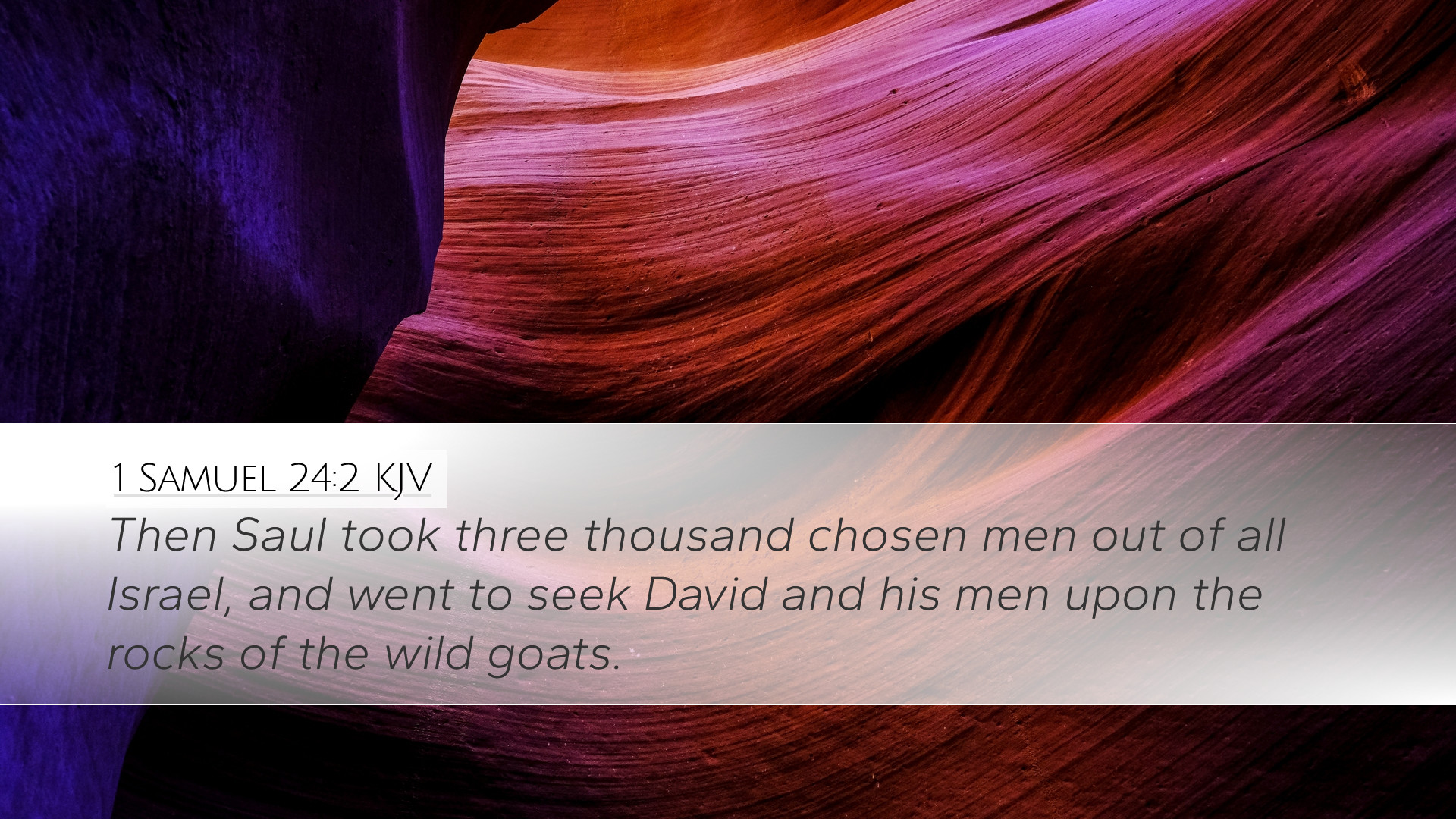Commentary on 1 Samuel 24:2
This verse presents a pivotal moment in the narrative of David's rise and tenure as the leader of Israel, showcasing a profound theological and moral dilemma for both David and King Saul. In this commentary, we will explore insights from various public domain sources such as Matthew Henry, Albert Barnes, and Adam Clarke.
Text of 1 Samuel 24:2
1 Samuel 24:2 "Then Saul took three thousand chosen men out of all Israel, and went to seek David and his men upon the rocks of the wild goats."
Contextual Overview
In the context of this passage, we see Saul's relentless pursuit of David, reflecting the tension and conflict between the two men. This pursuit is emblematic of the broader struggle between divine authority and human ambition, as Saul's fear and jealousy lead him to irrational and violent actions against David, whom God has anointed as his successor.
Matthew Henry's Insight
Matthew Henry emphasizes the significance of Saul’s choice to gather "three thousand chosen men." This selection indicates the seriousness of his intent to eliminate David, showcasing Saul’s desperation to maintain his kingly authority. Henry notes:
- The Nature of Desperation: Saul’s actions are driven by fear and a misguided sense of duty to protect his throne.
- The Divine Purpose: Despite Saul's efforts, God’s sovereign plan for David cannot be thwarted. Henry illustrates how God orchestrates events, allowing Saul's pursuit to serve a greater purpose in David's life.
Albert Barnes' Perspective
Albert Barnes provides a historical and theological analysis of Saul's pursuit. He suggests that Saul’s actions stem from a combination of anger, envy, and his gradual moral decline:
- Saul's Decline: Barnes notes that Saul’s spiritual state deteriorates as he increasingly acts out of fear rather than faith.
- Symbolic Meaning: The "rocks of the wild goats" symbolize the wildness and chaos that the pursuit of power can generate, suggesting that Saul is not only pursuing David but also descending into turmoil.
- The Sovereignty of God: Barnes points out that this situation illustrates how God often allows His chosen servants to be tested by their adversaries, emphasizing David’s eventual rise and preparation for kingship.
Adam Clarke's Interpretation
Adam Clarke offers a detailed exposition on the geographical and symbolic implications of the "rocks of the wild goats." He posits that:
- Spiritual Wilderness: The wilderness setting highlights the spiritual and emotional isolation that David experiences, underscoring the severity of his plight under Saul’s oppressive reign.
- David’s Refuge: Clarke argues that these rocky terrains serve as both a refuge for David and a testament to his evasion skills, reflecting his reliance on God's guidance in the midst of danger.
Theological Implications
This passage serves as a rich ground for reflecting on several theological themes:
- The Nature of Divine Providence: God's sovereign hand is evident as He allows David to face trials that prepare him for greater responsibilities.
- Moral Leadership: The contrasting leadership styles of Saul and David present a case study in moral authority versus tyrannical rule. Saul's fear leads to increasing moral failure, while David's integrity is highlighted in the face of persecution.
- Human Suffering and Divine Deliverance: This narrative encapsulates the journey of faith, where faithful individuals often face opposition, yet are preserved and eventually vindicated by God.
Practical Applications
As pastors, students, and theologians explore this passage, there are several practical applications to consider:
- Confronting Personal Conflict: Like David, individuals must navigate conflict with integrity and faith, trusting in God’s timing for resolution.
- Leadership Lessons: The characteristics exhibited by Saul serve as a cautionary tale regarding the dangers of pride and envy in leadership roles.
- Faith Under Fire: The narrative encourages believers to maintain faith in God during challenging circumstances, reflecting on how trials might serve as preparation for future challenges.
Conclusion
1 Samuel 24:2 encapsulates a critical juncture in the life of David and the unfolding drama of Israel's leadership. The collective insights from Matthew Henry, Albert Barnes, and Adam Clarke provide a multifaceted understanding of the themes of providence, leadership, and the struggle between good and evil. For scholars and practitioners of the faith, this verse serves as a reminder of the complexities involved in human authority and the unwavering sovereignty of God in the affairs of men.


